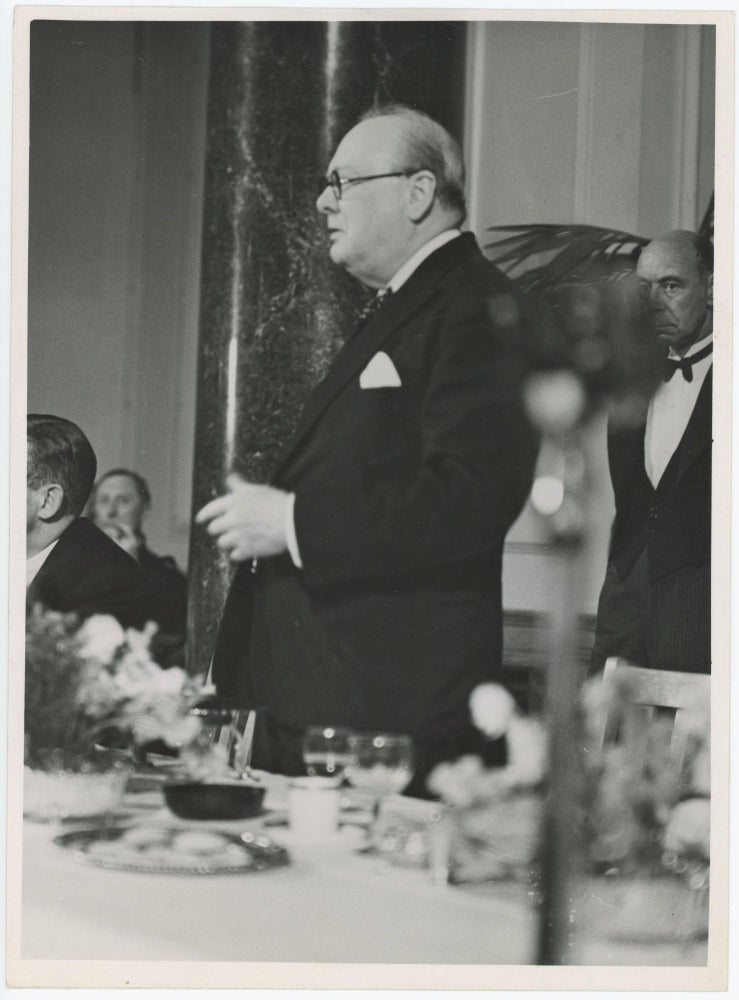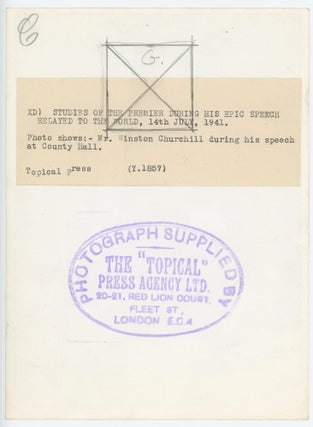An original Second World War press photograph of Prime Minister Winston S. Churchill delivering his "Do your worst - and we will do our best" speech of 14 July 1941 in London
London: The Topical Press Agency Ltd, 14 July 1941. Photograph. This is an original Second World War press photograph of Prime Minister Winston S. Churchill delivering his “Do your worst – and we will do our best” speech of 14 July 1941. This speech was delivered at a luncheon by the London County Council at the County Hall after the review of the Civil Defence Services in Hyde Park. Composition of this image is compelling, Churchill the focal point, standing, centered in the image, in profile, his left hand just slightly out of focus, caught gesticulating during his remarks.
The gelatin silver print is on heavy glossy photo paper and measures 6 x 8 in (15.24 x 20.32 cm). Condition is very good, the paper clean, trivial superficial scuffing visible only under raking light. The verso features an inkstamp stating it was “SUPPLIED BY THE “TOPICAL” PRESS AGENCY LTD.” A typed caption affixed to the verso is titled “STUDIES OF THE PREMIER DURING HIS EPIC SPEECH RELAYED TO THE WORLD, 14TH JULY 1941.” The caption has a Topical Press identification number and states: “Photo Shows: - Mr. Winston Churchill during his speech at County Hall.” A pencil-drawn “X” within a square corresponds with the location of Churchill’s head on the photo, suggesting that the image may have been cropped thus for publication.
On 14 July 1941, Churchill was just a little more than a year into his wartime premiership, the United States was still a long five months from entering the war, and Britain’s position was still precarious. Churchill’s first year in office saw, among other near-calamities, the Battle of the Atlantic, the fall of France, the evacuation at Dunkirk, and the Battle of Britain, with both sustained aerial attacks on civilian populations of London and other cities and the real prospect of Nazi invasion of England.
Churchill’s speech of 14 July followed a review in Hyde Park of the “many grades and classes – the wardens, the rescue and first-aid parties, the casualty services, the decontamination squads, the fire services, the report and control centre staffs, the highways and public utility services, the messengers, the police” – of the Civil Defence Services. Churchill acknowledged that the Civil Defence Services “have grown up in the stress of emergency” and “been shaped and tempered by the fire of the enemy”. In his speech, Churchill used this review as a tangible symbol of the preparedness, endurance, and resolve of Britain generally and London particularly. Churchill encapsulated the speech in the line delivered as a direct challenge to Hitler: “You do your worst – and we will do our best.” Far from a passive call for resistance, this line was immediately followed by “Perhaps it may be our turn soon; perhaps it may be our turn now.”
The London County Council was established by the Local Government Act of 1888 to meet the long-standing need for a centralized London government and served this purpose until 1965 – coincidentally the year of Churchill’s death – when it was replaced by the Greater London Council. The London County Council was the first directly-elected, London-wide municipal authority. The County Hall, opened by King George V in 1922, is on the South Bank of the Thames beside Westminster Bridge and served until the mid-1980s as the seat of London’s local government. Remarkably, as Churchill said in his opening remarks, his speech of 14 July 1941 was his first time in the County Hall.
This press photo once belonged to a newspaper’s working archive. During the first half of the twentieth century, photojournalism grew as a practice, fundamentally changing the way the public interacted with current events. Newspapers assembled expansive archives, including physical copies of all photographs published or deemed useful for potential future use, their versos typically marked with ink stamps and notes providing provenance and captions. Today these photographs exist as repositories of historical memory, technological artifacts, and often striking pieces of vernacular art. Item #005586
Price: $200.00


